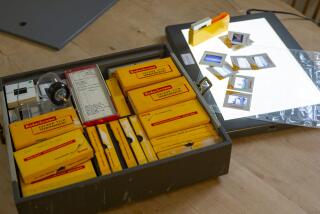The key to extinguishing memories: Remembering to forget
All psychotherapists -- and most criminal attorneys -- know that memories are fragile things. Once a seemingly well-entrenched memory for a given event -- what psychologists call a declarative memory -- is taken out for inspection, it is subject to being frayed, recolored, reinterpreted and altered. The result is that when that when a memory is returned to long-term storage, it can bear little resemblance to the memory that was laid down initially, or which has been brought out before and subject to change.
A new study finds there is one more thing a bystander can do when someone pulls out a declarative memory: With a bit of sleight-of-mouth and little more, the witness to remembrance can erase it. Or, at least, he or she can make some salient detail of the memory disappear by quietly replacing it with a new and conflicting detail.
The study was published Monday in the journal Proceedings of the National Academies of Science.
Neuropsychologists at Iowa State University used the pilot episode of the television show “24” to demonstrate what they called a “noninvasive” way to induce selective amnesia in a group of students and other willing research subjects in and around Ames, Iowa. After having subjects watch the episode, they sought to determine what it would take to get them to forget that in the show, the terrorist subdues a flight attendant with a hypodermic needle.
Twenty minutes after their viewing ended, some of the subjects had their memories of the episode “reactivated” when they were prompted by researchers to give a full account of the program’s details. Others were kept busy for a brief spell with an unrelated task and didn’t have that reactivation.
Then, the researchers tried to pull off their memory heist. They read for all subjects a plot-review narrative but replaced the hypodermic needle with a stun gun to see how the subjects’ memory of the episode was altered. The subjects whose memory of the “24” episode had been “reactivated” and then manipulated with false information were very likely to have forgotten there had been a hypodermic needle in the original plot. Those who had no warm-up memory reactivation and were just fed the plot review narrative with the false information were far more likely to remember it was a hypodermic needle that was used to subdue the flight attendant.
Even when a new crop of subjects watched “24” and were immediately sent home for 48 hours before coming back, the pattern of forgetting was the same. When subjects returned, those whose memories of the episode were reactivated and soon thereafter manipulated with false information were highly likely to have forgotten they had watched a flight attendant subdued with a hypodermic needle. Subjects who came back and first got the narrative with the false detail in it (without first reactivating their own memories of the episode) tended to hold fast to the original memory they had laid down: that it was a hypodermic needle, not a stun gun, that was used to subdue the flight attendant.
In other words, a memory gets laid down one way when it’s first experienced. And if you’re a psychotherapist (or an unethical criminal attorney) looking to alter that memory by deleting some vital detail, it won’t work to simply rewrite the script for the post-traumatic stress disorder sufferer (or the witness). You’d have to let him or her bring out the full memory, and only then read it back to him or her with the painful or incriminating details altered or missing. The current research suggests that for a memory to be rewritten, it must first be dredged up and reactivated by its maker.
This study may help explain why sufferers of post-traumatic stress disorder seem to improve when they get therapy that coaxes them to pull out their painful memories and recast them in a less menacing form before placing it back in storage. By contrast, people who struggle alone to suppress painful memories rarely succeed in escaping those memories’ toxic effects: Their unwillingness to reactivate the original memory robs them of the opportunity to de-fang it with a well-chosen bit of manipulation.







